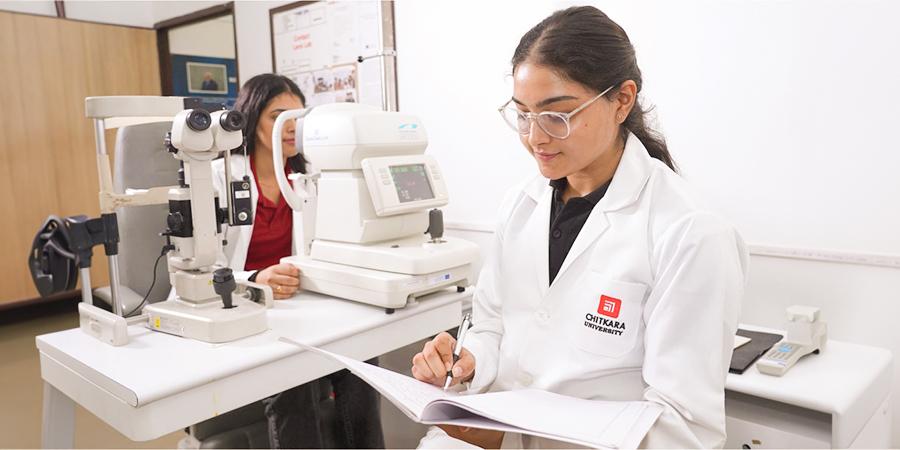A Day in the Life of an Optometry Student: What to Expect
Let’s take a journey through optometry education’s demanding yet fulfilling routine. From early morning lectures and immersive clinical training to dedicated study sessions and active participation in extracurricular activities, this piece thoroughly explores the everyday experiences and obstacles that aspiring optometrists encounter throughout their educational path.
Early Mornings and Lectures
The life of an optometry student often begins bright and early. Most optometry programs start the day with lectures, ensuring students receive a robust theoretical foundation. These lectures cover various subjects such as anatomy, physiology, optics, and ocular diseases. Expect to spend your mornings immersed in the world of eye health and vision science. Professors with extensive knowledge in their respective fields guide students through these fundamental topics, setting the stage for more specialised learning later in the program.
Hands-On Clinical Training
A particularly exhilarating aspect of optometry education revolves around hands-on clinical training. Although it usually begins later in the program, clinical training steadily becomes indispensable to your everyday schedule. Throughout this phase, a valuable opportunity will be presented to you, allowing for direct interaction with real patients. Within this context, you will conduct comprehensive eye examinations and actively refine your skills in diagnosing and treating various eye conditions. This practical exposure is the cornerstone for cultivating the vital competencies necessary to excel as a capable optometrist. Guided by experienced faculty members, you will gain the confidence and expertise essential for success in patient care, effectively bridging the gap between theoretical understanding and real-world application.
Study Sessions and Labs
After your morning lectures and clinical training, it’s time to hit the books. Optometry students are known for their rigorous study routines. You’ll spend hours in the library, studying the intricacies of the eye, learning about different eye diseases, and mastering the various diagnostic tools used in the field. Labs provide opportunities to practice these skills under supervision. These hands-on sessions are where you’ll learn to use specialised equipment like phoropters and slit lamps, becoming proficient in techniques such as refraction and ocular examinations. The mix of theoretical understanding and practical skills acquired during study sessions and labs prepares you for the diverse challenges you’ll encounter in your future practice.
Extracurricular Involvement
While the academic workload in optometry school is intense, it’s also essential to strike a balance. Numerous students actively participate in extracurricular pursuits connected to optometry, including membership in student clubs and involvement in vision care outreach initiatives. These endeavours enrich your educational experience while affording you valuable opportunities to expand your network among peers and seasoned professionals within the field. Joining clubs like the Optometry Student Association can provide valuable opportunities for leadership, teamwork, and community involvement. Vision care outreach programs offer a chance to give back to the community while sharpening your clinical skills and developing cultural competence.
Patient Interaction
Patient interaction is a crucial aspect of optometry education. As you progress further in your program, a noteworthy opportunity unfolds where you actively interact with patients while closely supervised by seasoned faculty members. This immersive, hands-on experience is pivotal in honing your communication abilities, enhancing your bedside manner, and expanding your capacity for empathy towards patients’ varied needs and concerns. Building trust and establishing rapport with patients is a cornerstone in optometry, as it creates a space where patients feel at ease sharing their eye health concerns and adhering to prescribed treatment plans. These early patient interactions provide a valuable foundation for your future clinical practice.
Preparing for Licensing Exams
Optometrists must be licensed to practice, and part of your education will involve preparing for licensing exams. This often includes review courses and mock exams to ensure you’re well-prepared to pass these critical tests. The licensing examinations generally encompass a broad spectrum of subjects, from diagnosing and treating ocular diseases to optometric legal principles and assessments of clinical skills. Fortunately, your optometry program will provide comprehensive guidance and abundant resources tailored to facilitate success in these crucial exams. These resources ensure you fulfil the prerequisites for acquiring your license to practice as a certified optometrist.
Balancing Work and Life
Staining equilibrium between your academic obligations and personal well-being is paramount at NSHM, an optometry college in Durgapur and Kolkata. Optometry school undoubtedly presents its share of challenges, underscoring the significance of allocating time for relaxation, physical activity, and self-care. These practices are pivotal in safeguarding your overall health and preserving your motivation throughout your educational odyssey. Embracing strategies such as effective time management, establishing achievable objectives, and seeking assistance from peers and faculty members can significantly assist you in achieving a harmonious equilibrium between your academic pursuits and your personal life.
The life of an optometry student is demanding but rewarding. From the early morning lectures to the hands-on clinical training, the daily life of an aspiring optometrist is a treasure trove of opportunities for continuous learning and personal growth. By actively participating in extracurricular activities, refining your clinical acumen, and maintaining a harmonious work-life equilibrium, you’ll adeptly navigate the intricate challenges of optometry education, thereby charting a course toward a successful career as an optometrist. Therefore, if you’re contemplating a career in this field, brace yourself for a day-to-day experience that seamlessly blends education and fulfilment.
Within this demanding yet rewarding routine, optometry students embark on an enriching journey that arms them with the knowledge and skills to effect substantial change in eye health and vision care.







